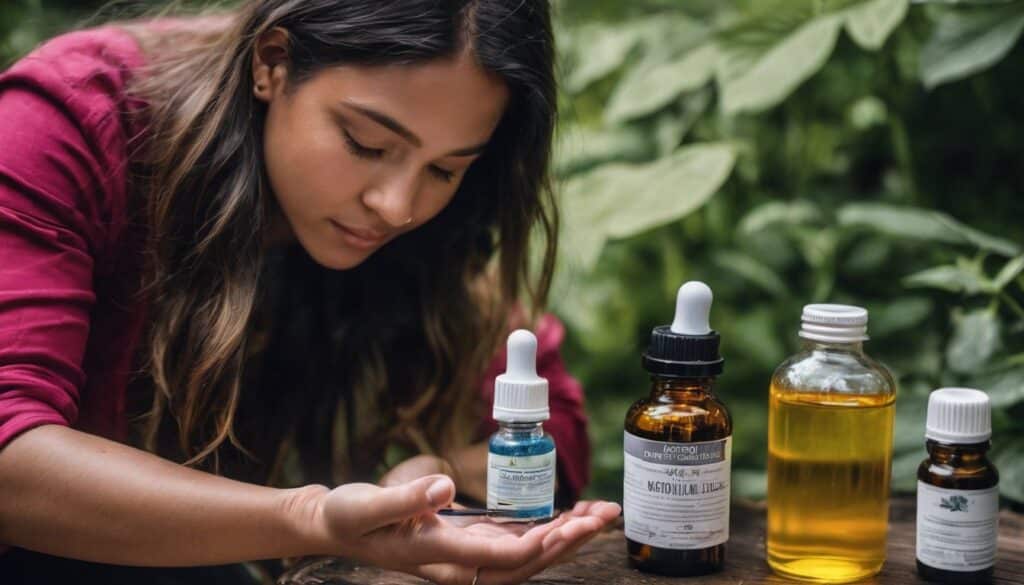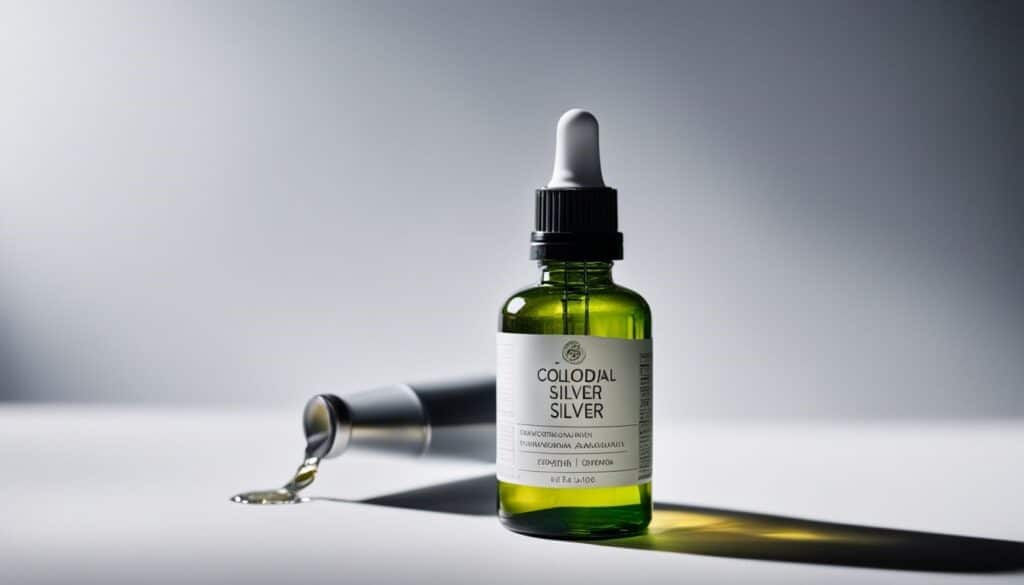How To Use Colloidal Silver Safely And Effectively

You might have heard about colloidal silver if you’re looking for natural health remedies. This ancient solution was once a go-to antibiotic before modern medicine took over. Our article will guide you through the safe and effective use of colloidal silver, helping to clear up confusion and ensure responsible use.
Discover the right way forward with us.
Key Takeaways
-
- Colloidal silver can be used on the skin to help heal wounds and prevent infection by killing harmful germs. It is safe when used this way but should not be taken by mouth.
-
- There are risks if you take colloidal silver by mouth, like getting a condition that turns your skin blue-gray, which might not go away. Only use colloidal silver as directed and talk to a doctor first.
-
- Instead of using colloidal silver for sinus issues or wounds, try safer alternatives like saline nasal rinses or natural remedies such as honey and aloe vera.
-
- Keep colloidal silver in a cool, dark place and ensure you get it from trusted places that tell you what’s in their product and how they made it.
-
- Always ask healthcare professionals before using colloidal silver since too much can be dangerous, causing permanent problems with your skin or other harm to your body.
What is Colloidal Silver?

Colloidal silver is a suspension of tiny silver particles in a liquid. It has been historically used for its antimicrobial properties and is often sold as a dietary supplement for various health purposes.
Definition
Colloidal silver is a liquid mixed with suspended tiny silver particles—these small pieces of silver float in the water or another fluid. Long ago, people discovered silver could help keep water and food from worsening.
They would even put silver coins in milk to stop it from spoiling too fast.
Before we had medicines like antibiotics, doctors used colloidal silver to help with infections and heal wounds. Some folks say this silvery mix can kill germs and fix skin problems.
However, scientists have not yet found proof that these claims are true for all the uses people talk about. Even though you might find colloidal silver products sold as health helpers, it’s important to know they aren’t checked by groups like the Food and Drug Administration (FDA) like other medicines.
History of use
Silver has been used for centuries to keep things clean and germs-free. People put silver coins in their water jars or milk containers long ago. This kept the water and milk fresh longer.
In India, silver was also used in Ayurvedic medicine.
Doctors found out that giving patients colloidal silver before they had antibiotics helped them get over infections and heal wounds faster. They saw that tiny bits of silver could fight against bad stuff like bacteria without harming the body too much.
Common Uses of Colloidal Silver

Colloidal silver is commonly used for topical application to promote wound healing and treat rhinosinusitis. Other potential uses include its antimicrobial properties for skin infections and as a complementary therapy, although evidence supporting these uses is limited.
Topical application for wound healing
Silver ingredients like colloidal silver are good for helping skin heal. You put it right on the wound or burn, killing bad germs. Silver can break apart proteins that these germs need to live.
Doctors have discovered that putting creams with silver sulfadiazine on wounds can make them heal better. People use bandages soaked in silver when they have burns to help the skin get well faster.
Using topical colloidal silver is safe and does not cause health problems like oral ingestion might do. It’s popular for looking after cuts and grazes at home or in hospitals.
Remember, this kind of silver has been used for a long time because it helps stop infections on your skin without hurting you if you use it right.
Treatment for rhinosinusitis
Colloidal silver has shown potential in treating rhinosinusitis due to its anti-biofilm properties, which can help reduce inflammation and fight infection. However, it’s essential to note that topical colloidal silver sinus rinses for 10 days are safe but may not be more effective than culture-directed treatment for rhinosinusitis.
When considering colloidal silver as a treatment for rhinosinusitis, it’s crucial to weigh the limited evidence of its benefits against other available therapies and consult healthcare professionals for personalized advice.
Other uses backed by limited evidence
Although evidence is limited, colloidal silver is sometimes used for wound healing and to improve skin disorders.
- Some people use colloidal silver to treat rhinosinusitis, but strong evidence does not support its efficacy.
- The claim that colloidal silver can prevent or cure certain diseases lacks robust scientific backing.
- Limited evidence exists for the antimicrobial effects of colloidal silver in topical applications, such as wound healing.
- However, it’s important to note that the FDA does not regulate colloidal silver as a treatment or cure for any condition.
Safety and Side Effects of Colloidal Silver
Regarding safety, it’s important to be aware of the risks and complications associated with ingesting colloidal silver. While topical use has potential health benefits, high concentrations of silver can cause serious side effects, including argyria, a bluish-gray skin discoloration.
Understanding the forms and doses of colloidal silver before using it is crucial.
Risks and complications of oral consumption
Colloidal silver can cause serious side effects, such as argyria, which turns the skin bluish-gray. When taken orally over time, it can build up in the body and lead to complications.
The side effects of ingesting colloidal silver range from changes in skin color to more severe health issues due to the accumulation of silver in the body tissues.
It’s important to note that using colloidal silver orally is not recommended due to these potential risks. Instead, considering alternative options and being cautious about colloidal silver products is advised for maintaining good health without exposing oneself to these possible complications associated with oral consumption.
Health benefits of topical use
Topical use of colloidal silver may offer health benefits for wound healing and skin conditions. It is known for its broad antibacterial effects, potentially promoting faster recovery from minor cuts, scrapes, and burns.
Colloidal silver-based dressings are used in medicine to support wound healing and reduce inflammation. These properties make it a popular choice for individuals seeking alternative methods to promote skin health.
Colloidal silver can help keep wounds clean when applied topically due to its antiseptic properties. Additionally, its purported ability to reduce inflammation may aid in soothing irritated or damaged skin.
Forms and doses of colloidal silver
Colloidal silver comes in various forms, such as liquid, gel, or spray.
-
- The doses of colloidal silver can vary depending on the form. For instance, liquid colloidal silver may be taken orally, while gel and spray forms are for topical use.
-
- When using liquid colloidal silver orally, it’s crucial to follow the recommended dosage instructions provided by the manufacturer.
-
- Topical application of colloidal silver should be done cautiously to avoid overuse and potential side effects.
Making an Informed Decision
Consider colloidal silver’s potential risks and benefits, explore alternative options, and carefully assess product quality to make a well-informed decision. Read on to learn more about the safe and effective use of colloidal silver for your health needs.
Alternative to colloidal silver
For wound healing, Consider alternatives like honey, aloe vera, or medical-grade manuka honey. These natural remedies have antimicrobial properties and are supported by evidence for their effectiveness in promoting wound healing.
Furthermore, they do not pose the same risks as colloidal silver when used topically.
Another alternative is saline nasal irrigation for managing rhinosinusitis. This simple and effective method helps clear mucus and reduce inflammation in the sinuses without the potential risks associated with using colloidal silver nasal sprays.
Storage and product quality
To maintain the quality of colloidal silver, store it in a cool, dark place away from direct sunlight and extreme temperatures. Keep it out of reach of children to prevent accidental ingestion.
Always check the manufacturing and expiry date before use to ensure product quality and effectiveness. Look for reputable brands that adhere to safety regulations and have good customer reviews.
Ensure you purchase colloidal silver from trusted sources or retailers who provide detailed information about their product’s ingredients and production process. Consider consulting healthcare professionals for recommendations on reliable products.
Potential for misuse or overuse
Misusing or overusing colloidal silver can lead to serious health issues. The FDA has warned against taking colloidal silver by mouth because it can cause a condition called argyria, which turns the skin a bluish-gray color that may be permanent.
Despite claims about its effectiveness, there’s no evidence that colloidal silver is a cure-all for cancer or any other medical condition. Daily exposure to silver, whether through supplements or other products, could also lead to irreversible skin discoloration and other harmful effects.
Therefore, it’s essential to exercise caution and consider safer alternatives for promoting good health.
Some people might be tempted to try colloidal silver as an alternative treatment due to its popularity in complementary and integrative health circles. However, the risks of ingesting or using this product should not be underestimated.
Tips for purchasing and using colloidal silver safely and effectively
To ensure you’re using colloidal silver safely and effectively, consider the following tips:
-
- Look for reputable brands that provide clear information about their product’s content and manufacturing process. Avoid purchasing from vendors making unrealistic health claims.
-
- Check for particle size and concentration information on the product label, as these factors influence the effectiveness of colloidal silver. Opt for products with smaller particle sizes, preferably below 100 nanometers.
-
- Consult a healthcare professional before starting any colloidal silver regimen, especially if you have underlying health conditions or are taking other medications.
-
- Use colloidal silver topically for wound care under medical guidance, ensuring it’s applied to clean minor cuts or burns to aid healing.
-
- Understand that oral consumption of colloidal silver is not recommended due to potential side effects and lack of scientific evidence supporting its use.
-
- Be cautious about storing and handling colloidal silver, ensuring it is kept away from direct sunlight and extreme temperatures to maintain its quality and efficacy.
-
- Educate yourself about alternative treatment options with proven effectiveness for various health concerns, seeking guidance from healthcare professionals for reliable advice.
-
- Be mindful of the potential risks associated with the overuse or misuse of colloidal silver, such as argyria (skin discoloration) or organ damage due to prolonged exposure.
-
- Stay informed about current research findings on colloidal silver to make well-informed decisions regarding its usage for your health needs.
FAQs
Q: What is colloidal silver, and how is it used?
A: Colloidal silver is a popular solution containing silver particles. It is often used topically or taken orally as a dietary supplement.
Q: Is colloidal silver safe to use?
A: The safety of colloidal silver is a topic of debate. While some people believe it is safe and effective, others have concerns about its potential side effects, such as argyria.
Q: Can colloidal silver be swallowed?
A: Swallowing colloidal silver is a common method of consumption, although its safety and effectiveness are still under question.
Q: What are the potential risks of using colloidal silver?
A: The use of oral colloidal silver may pose risks due to the potential buildup of silver in the body, leading to a condition called argyria. Additionally, the long-term effects of ingesting silver nanoparticles are not fully understood.
Q: How should colloidal silver be used topically?
A: When using colloidal silver topically, it is important to apply it sparingly to the affected area and to avoid using it on open wounds or delicate skin.
Q: Where can colloidal silver be purchased?
A: Colloidal silver is often available in health food stores, online retailers, and through direct sales distributors.
Q: Is it safe to use colloidal silver for oral use?
A: The safety and effectiveness of oral colloidal silver are still uncertain. It is essential to seek advice from a healthcare professional before using it orally.
Q: What are the common uses of colloidal silver?
A: Colloidal silver was historically used to treat various conditions, although its effectiveness in modern healthcare is still debated. Some people try colloidal silver to prevent or treat certain ailments.
Q: Are there regulations on the use of colloidal silver?
A: Colloidal silver falls under regulatory scrutiny due to its potential risks and lack of proven benefits. In some regions, restrictions on its marketing and use exist.
Q: Is there scientific evidence supporting the use of colloidal silver?
A: The scientific evidence supporting the use of colloidal silver is limited, and its long-term safety and effectiveness are still not fully established.

